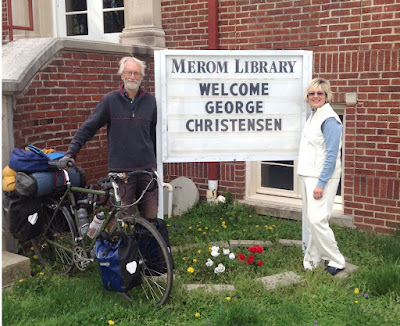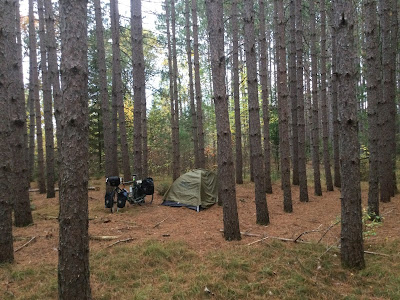I have a new answer to that question, “What’s your favorite Carnegie?” It had been the Carnegie in the tiny town of Merom, Indiana (population 218) on the Wabash River along the Illinois border in the southern part of the state. It had put “Welcome George Christensen” on its message board having been alerted by the librarian in the Vincennes Carnegie, thirty miles south, that I was headed that way. I can still feel a tingle of emotion at the shock of seeing my name as I approached the library, especially since it is a rare library that has a message board for posting notices.
I received an equally unexpected thrill yesterday that nearly took my breath away when I spotted the Hayward, Wisconsin Carnegie and discovered that it was now a bicycle shop. I’m always happy to see a bike shop under any circumstances, especially in small town America where they are an extreme rarity. But to come upon a Carnegie that was now a bike shop was beyond imagining.
Hayward’s Carnegie is well-established as a bike shop having been in the
Carnegie for ten years and at another location before that. Hayward may only have a population of 2,300, nearly double of what it had been when the Carnegie was built in 1903, but it has a steady stream of tourists to take advantage of the fishing in the many lakes in the area and other outdoor activities. It hosts the Birkbeinner cross country ski race, the largest in North America with 13,000 participants, and the Chewuamegen mountain bike race, the largest in the US with 2,500 participants.
Along with bikes the shop sells skis and a wide selection of sport wear. The tall windows and high ceilings and wooden floors make it a most pleasing emporium. Racks of clothes fill a large part of the upstairs with just a small portion devoted to bike gear and skis. The lower half is solely bicycles and related gear and a repair station.
With Wisconsin the home of Trek, that is its prime brand. Along with road and mountain bikes it sells an increasing number of e-bikes. The shop used to have rentals, but with the bike shortage the past two years, the owners felt bad about having bikes that weren’t being used regularly when there were customers desperate for a bike, so they sold all their rental bikes. I was sorry my tires weren’t in need of replacing or that I didn’t have any other needs so I could have left with a sales receipt as a souvenir.
I walked out of the shop so exhilarated I almost felt I could bring my Carnegie quest to a close having discovered the ultimate Carnegie. I had found something I didn’t even know I was looking for, though maybe that is what was behind this quest. All these years of biking to Carnegies had culminated with this one in the woods of northern Wisconsin. If it had been the thousandth that I had visited, that would have have truly validated its significance and verified some sort of divine guidance, but I’ve only reached the mid-nine hundreds.
It speaks to the lack of a Carnegie consciousness or of any on-going purveyor of the status of the 2,509 Carnegie libraries all over the world that not a single Carnegie librarian or aficionado who I’ve encountered over the years was aware of the Carnegie that was now a bike shop. I should have been asked time after time, “Have you been to the Carnegie that is now a bike shop?” How could this not have happened?
Whatever whisper I may have had of thinking this was the pinnacle and that any Carnegie after this would be meaningless was quickly suppressed. It only made me all the more eager for the next Carnegie in Cumberland and the ten more after that in Wisconsin that I had yet to get to. Six were still libraries. Could there possibly be another bike shop among the other five? Or what other surprise might await me of what one had become—a tattoo parlor, a florist, a pet store, a dance studio, a mini-neighborhood Walmart, a funeral home, a Dollar Store, a jewelry store, a gun store, a laundromat, an ice cream parlor, a cannabis outlet, an abortion clinic, a MacDonald’s? The possibilities are now endless.








2 comments:
George, you have inspired me to visit all of the Long John Silver's fast food restaurants that are now consignment wig shops and payday loan places.
Count me in!
Post a Comment